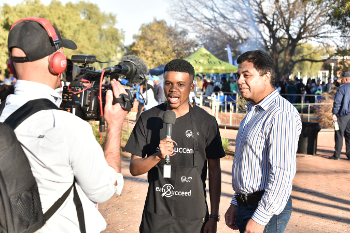Latest News Archive
Please select Category, Year, and then Month to display items
04 April 2024
|
Story Lunga Luthuli
|
Photo SUPPLIED
 Dr Juliet Kamwendo champions gender-inclusive climate action in Africa. Her expertise at the recently held AFR100 workshop highlighted vital steps towards sustainable and equitable development.
Dr Juliet Kamwendo champions gender-inclusive climate action in Africa. Her expertise at the recently held AFR100 workshop highlighted vital steps towards sustainable and equitable development.
Dr Juliet Kamwendo, Lecturer and Programme Director for Gender Studies in the Centre for Gender and Africa Studies at the University of the Free State, is spearheading efforts to integrate gender considerations into Africa's climate restoration agenda. Reflecting on her involvement, Dr Kamwendo stated, "This is particularly crucial, as women make up almost 50% of the population in Africa, and the depletion and degradation of land affect them disproportionately."
She recently served as a gender expert at the AUDA-NEPAD AFR100 workshop in Ouagadougou, Burkina Faso, from 25 to 29 March 2024. This initiative aims to restore forests and degraded land across Africa by 2030, with a focus on gender equality.
The workshop emphasised the integration of gender perspectives into the AFR100 project, acknowledging the disproportionate impact of land degradation on women. Dr Kamwendo's expertise highlighted the need to empower women in climate change interventions, addressing existing gender inequalities exacerbated by environmental degradation.
“Women – who are primarily responsible for household food security and water provision – bear the brunt of environmental degradation, leading to increased workloads, reduced income opportunities, and heightened vulnerability to climate-related disasters. Furthermore, the loss of forest cover and biodiversity further exacerbates the challenges faced by women, particularly in rural areas where they depend heavily on natural resources for their livelihoods,” added Dr Kamwendo.
Her participation highlights academia's crucial role in fostering inclusive and sustainable development, emphasising interdisciplinary collaboration to tackle complex environmental challenges. Through initiatives such as AFR100, stakeholders are working towards a more resilient and gender-responsive future for Africa.
Kovsie Biggest Braai a huge success
2017-08-30

Prof Francis Petersen, also attending the braai, is here being
interviewed by one of our #KovsieCyberStas, Thuli Molebalwa.
Photo: Charl Devenish
Even though Braai Day is celebrated nationally in September, students at the University of the Free State (UFS) had their own braai day. The Kovsie Biggest Braai was the biggest student community event of the year.
Takudzwa Nyamunda of the International Student Council said the idea for the braai came from the International Student Association as a social cohesion event for international students. “When the idea was presented to my office we realised the potential for such an initiative to be not just for students but for the whole Kovsie community.”
They realised there were not a lot of social cohesion events on campus where students and staff could just take a day to relax and embrace the feeling of being a Kovsie. He said he believed the braai could provide the right platform. The main objective of this project was to make it an institutional event with aspects of fundraising for the future.
Colleges made KBB a success
An estimated 3500 people attended the festivities on Red Square on 12 August. “We used the college format for the braai and it was set in the form of a challenge between the five colleges, but one of the colleges pulled out,” Takudzwa said. The colleges that did participate made a big contribution towards the success of the event and did all the braaing and selling.
Creating new Kovsie traditions
The idea behind the pilot project is that it becomes an annual event which in turn will form part of a new Kovsies tradition. “It received endorsement from top management therefore I believe it will form part of the Kovsie calendar for years to come,” Takudzwa said.